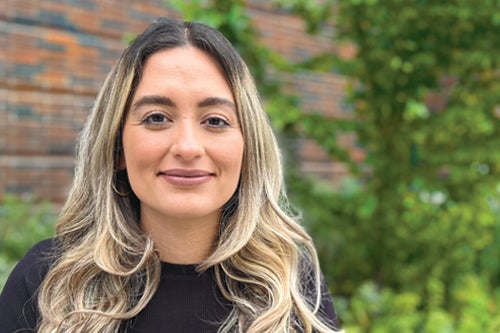
What is your background and areas of interest?
I am a first-generation college graduate, a sociologist by training, and a lifelong learner. Broadly, I study the experiences of Latine/x communities, including immigrants and their families at different life stages, to inform theories of immigrant incorporation, migrant [il]legality, social stratification (inequality), and law. Right now, I am writing a book on how immigration policies (and legal status) impact the experiences of older immigrants. I am also collaborating on additional research projects on the experiences of immigrant graduate students in US higher education and in the workforce after graduation. I teach courses in Latine/x sociology, immigration, race and ethnicity, economic inequality, and research methods.
Beyond my academic work, I love learning new things, creating new systems of organization, and traveling. Currently, I am learning how to create a blog, listening to Brown Ambition and The Mel Robbins Podcast, reading Don’t Believe Everything You Think by Joseph Nguyen, and making travel plans for next year.
What brought you to the University of Oregon?
I came to the UO to join the Department of Sociology from my postdoctoral fellow position at Brown University in Rhode Island. I was happy to return to the West Coast (I completed my PhD at UC Berkeley and undergraduate studies at Pomona College in California) to a beautiful green campus and was eager to support undergraduate students transitioning to the UO. College is an amazing time to grow and develop critical thinking skills, individual identities, networks, and professional goals.
How did you get involved in your field?
In college, I studied the history, struggles, and structural exclusion of Latine/x and communities of color in the United States through my Chicanx Latinx studies and sociology courses. These classes helped me identify exclusionary practices that I (and others) experienced, such as school tracking. I compared my educational path to that of my high school peers who did not attend college. I recognized that we were systematically and structurally tracked into different pathways that are difficult to break away from, and which are influenced, for example, by varying levels of poverty, support from key teachers/mentors, and cultural capital. Hence, I applied to conduct research with one of my professors (and now lifelong mentor) to continue learning, even though I didn't know what “research” was. Quickly, I realized that I loved researching topics I was interested in and teaching others. Sociology allowed me to continue pursuing this interest and to connect it with my interest in Chicanx Latinx studies, and since then, I have never looked back.
What’s the best advice you have for a college student?
These are my top five pieces of advice for college students (and for everyone):
- Read, read, read! If you pick up a book or article and learn one valuable lesson, it’s worthwhile. Don’t like to read? Try audiobooks or other digital tools. You can learn so much by reading credible sources; your local school/public/digital libraries have many underutilized resources.
- Try new things even when you are afraid. If you feel uncomfortable or scared, it often means you are growing.
- Ask a lot of questions and advocate for yourself! If you don’t ask, you won’t know.
- Everything is negotiable—including deadlines, job offers, and household duties (you would be surprised what people ask for and get). Always ask; if you get a “no,” remember you practiced asking.
- Find your people! Finding mentors and networks who can support you at different stages in your life and career is key to living a balanced and joyful life. I am where I am due to the intensive mentoring I have received (and I continue to pass it forward).
How can students contact you?
I can be reached via email (igarciav@uoregon.edu). I look forward to connecting with you!
